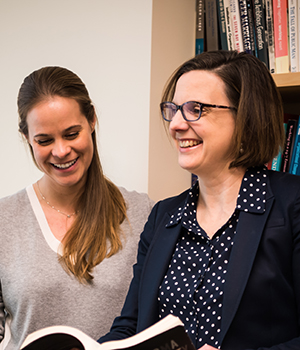
Erin Kelly
(she/her)
Management
Sustainably moving forward
In her students’ estimation, Professor Erin Kelly rises to the level of exceptional mentorship by channeling her expertise in Work and Organization Studies to the benefit of her advisees.
As the Sloan Distinguished Professor of Work and Organization Studies, Kelly creates open and candid relationships with her students, providing them with the means and confidence to succeed. “We try to focus on moving projects forward and keeping our energy up so we can do the work we are privileged to do,” she says.
Kelly investigates the implications of workplace policies and management strategies for workers, firms, and families; previous research has examined scheduling and work-family supports, family leaves, harassment policies, and diversity initiatives. As part of the Work, Family, and Health Network, she has evaluated innovative approaches to work redesign with group-randomized trials in professional/technical and health care workforces. Her book with Phyllis Moen, Overload: How Good Jobs Went Bad and What to Do About It, will be published by Princeton University Press in early 2020.
Sustainable graduate life
Because Kelly studies work and wellbeing, discussing work-life concerns with her advisees is commonplace. “I talk about this with my students all the time,” she says.
In Kelly’s words, she tries to “promote working in ways that feel sane and sustainable.” She does not count how many hours her students spend on projects or pay attention to where they work or how quickly they respond to emails. Kelly says that she knows her students are committed to this effort long term, and that everyone works differently.
One student nominator noted that Kelly was extremely supportive of her decision to have a child during graduate school, offering her advice about how to balance work and home as well as how to transition back into school after maternity leave. The nominator notes, “Erin does not view the baby as an impediment to my professional career.”
Kelly approaches her students to check in (a Mentoring Guidepost identified by the C2C program). Although students frequently check-in on each other, it is less common to see professors initiating contact, one C2C nominator says. For students who might be timid, or who are just are not used to asking for professors’ time, Kelly “takes the initiative to not to let them fall through the cracks.”
Giving more
In addition to providing advice on course selection and dissertation planning, Kelly offers her students “informal” advising (a Mentoring Guidepost) that goes beyond the usual academic parameters.
Kelly “explained to me the importance of networking in finding an academic job,” another student says, “I’ve appreciated this informal mentoring, particularly because I am a woman trying to enter a male-dominated field; understanding how to succeed professionally is important, but is not always obvious.”
Even when it may present a cost to her own work efficiency, Kelly supports her students overall growth. “She hired me as an RA on one of her projects so that I could improve my quantitative research skills,” another student says. “It would have been easier for her to hire someone with these skills already, but she wanted to help me develop professionally.”
Students should feel comfortable enough to share concerns with their advisors and mentors, Kelly says, “I am quite likely to share what I’m really feeling – even when that is a mix of excitement and anxiety about a particular project.” This candid approach sets a standard of open communication with her students. “I think it is useful for students to see that we can move forward,” Kelly says, “even when we are unsure exactly where a particular project or study is going.”
